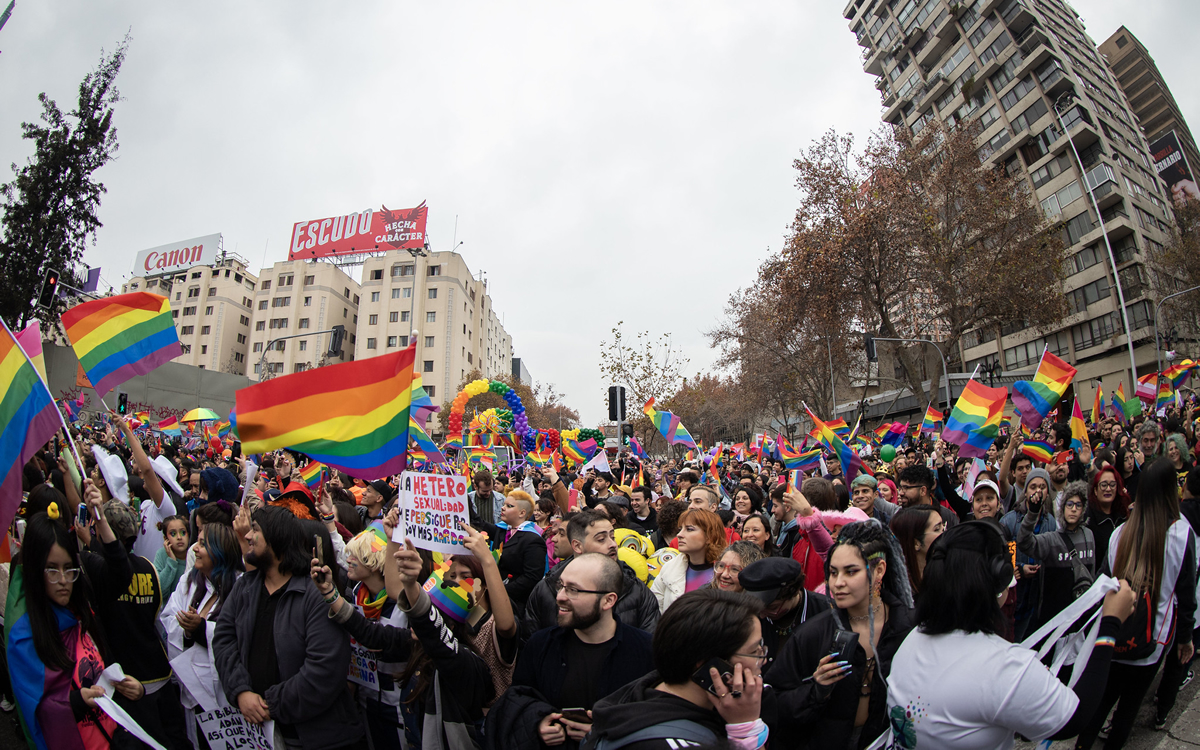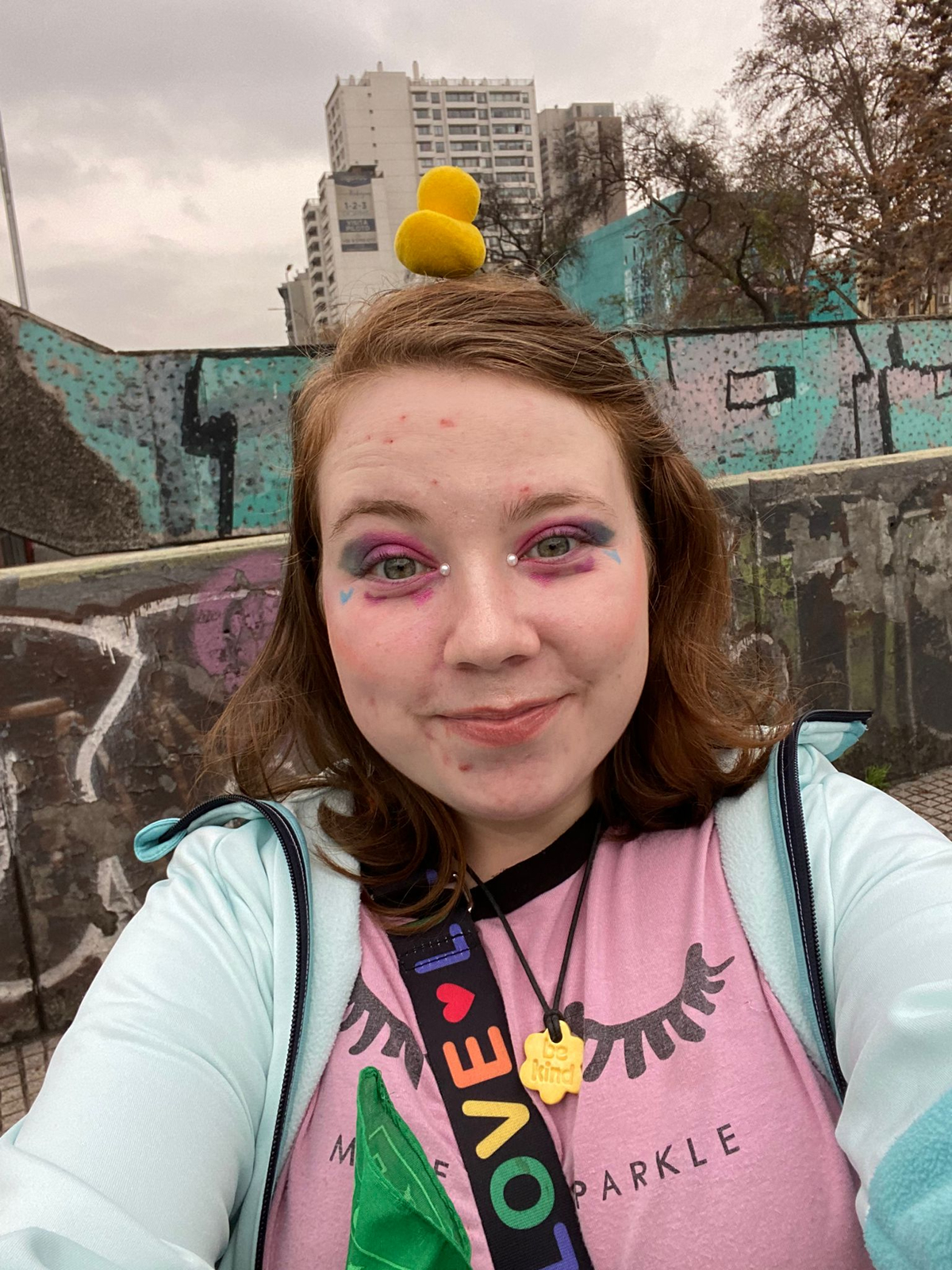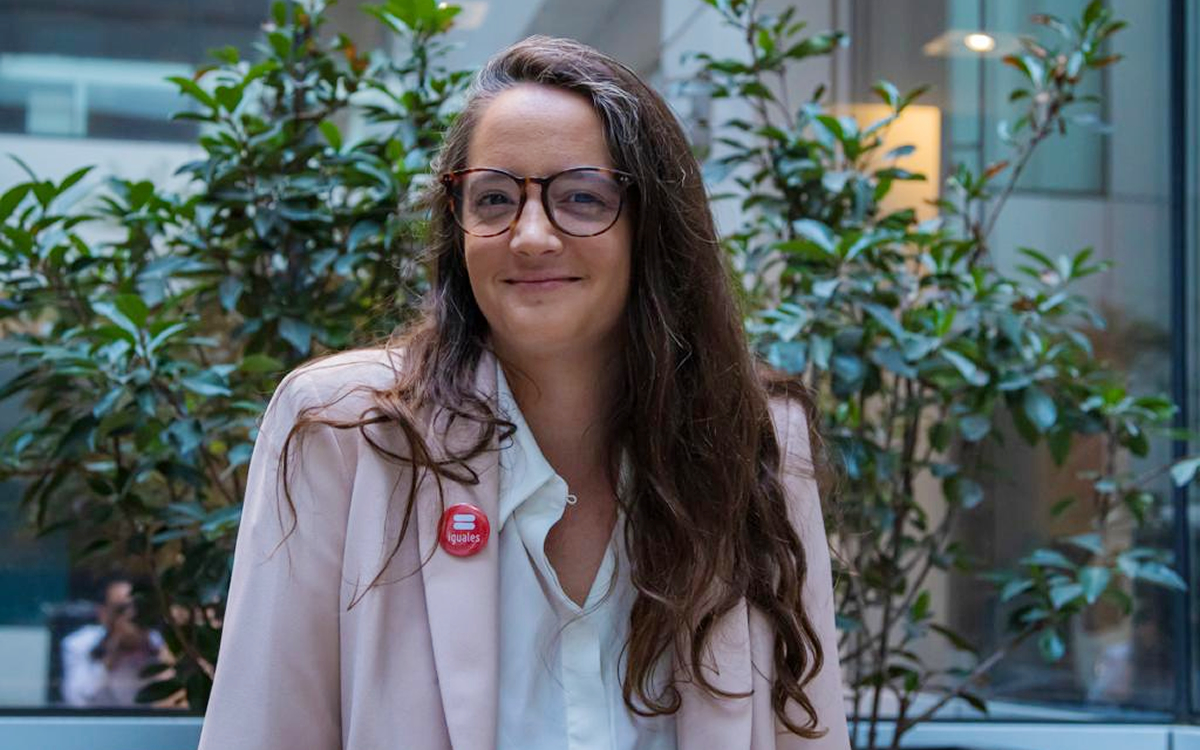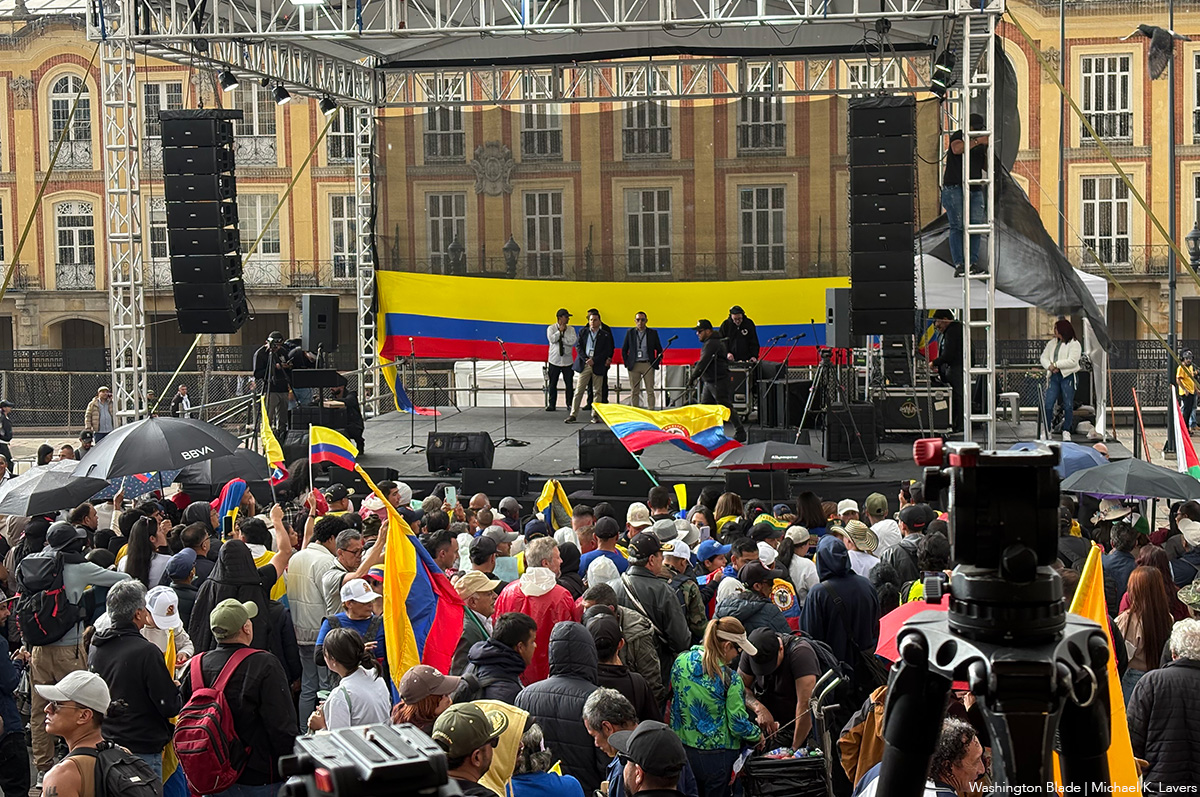South America
More than 180000 people participate in Chilean capital’s Pride march
Flooding from heavy rains prompted organizers to delay event

The Chilean capital’s annual Pride march took place on June 25 after organizers postponed them because of heavy rains that authorities have described as the worst in 30 years.
The weather front affected central and southern areas of Chile and caused floods that have affected a large part of the population. The march, however, was unexpectedly well-attended.
More than 180,000 people participated in the march the Movement for Homosexual Integration and Liberation organized.
“We are very happy with this unexpected reception,” said Movilh spokesperson Javiera Zúñiga. “While it is true that Pride marches have always been massive, we expected a smaller turnout than in previous years because this time we had to postpone the parade for weather reasons. However, the opposite happened, since Pride 2023 became the most massive (one) that has been convened so far.”
Eleanor Berkenblit, a 21-year-old American woman from Sharon, Mass., who is studying in Chile, participated in a Pride parade for the first time in her life.
“I really enjoyed the march,” she told the Washington Blade. “I felt proud to be surrounded by people who looked like me, all dressed in colors with their flags and shouts of happiness. I was very excited to march, to be in community and to read the handwritten signs.”

March participants demanded Congress reform the country’s anti-discrimination law, known as the Zamudio law, and asked President Gabriel Boric’s government to support the creation of an institution that promotes and defends queer rights. They also demanded an end to violence against LGBTQ and intersex people in Chile, which has been on the rise over the last year.
An American tourist was recently the victim of a hate-motivated attack in Puerto Varas, a city in southern Chile that is roughly 630 miles south of Santiago.
“I was attacked in Puerto Varas at gunpoint between 8 and 9 a.m. on June 18 on the train tracks near the Bellavista crossing, in the vicinity of Phillipi Park, by a guy I met on a dating app,” said the man on TikTok after saying the person who attacked him identified himself as Benjamin.
“I took the gun away from him, but he took it back and hit me in the face (…) definitely (the aggressor) has some wounds on the back of the head, as I was able to inflict some of that during my struggle. I have reported all this to carabineros (the Chilean police),” he added.
Movilh, after speaking with the tourist and expressing its solidarity with him, sent his details to the U.S. Embassy in Santiago in order for them to provide further guidance and follow up with the investigations.
“Many people believe that after the approval of equal marriage and homoparental adoption, homo/transphobia ceased. However, they are wrong. In the last year, hate crimes have doubled,” said Ramón Gómez, Movilh’s human rights officer, in a speech during the Santiago Pride march.
The organizers said the large turnout “surprised” them, and said that it surpassed last year’s march, despite the cold and gray day in Santiago.
Several ambassadors participated in the march. Among them was Australian Ambassador to Chile Todd Mercer, who expressed his country’s commitment to the LGBTQ and intersex community. Ambassadors from Argentina, Denmark, the U.S., Finland, Ireland and Norway, among others, also attended.
Some parties within the governing coalition did not participate.
Fundación Iguales Executive Director María José Cumplido noted her disagreements with Boric’s government.
“We see with real concern that in more than a year of the current government we have not seen concrete advances in the rights of sexual and gender diversity in Chile,” said Cumplido. “Although we have had a good relationship with the Ministers of Justice and Foreign Affairs, there is a lack of an official interlocutor in these matters that we believe should be the Minister of Women and Gender Equality, who has been somewhat distant in the matter.”

Cumplido indicated her organization feels that “in addition to the reform of the Anti-Discrimination Law, we believe that the creation of an institutional framework that is housed in the Undersecretary of Human Rights is urgent, since the country needs to have an entity that is capable of preventing all types of discrimination in a transversal manner, not only that directed at LGBTI+ people, generating public policies that move towards the eradication of all types of violence.”
“Another of our focuses is to give immediate urgency to the José Matías Law, which addresses bullying and discrimination against students based on their sexual orientation and/or gender identity. We see with concern the rising figures of violence in schools, but if we zoom in on that, the attacks against trans students are becoming more frequent and that hurts us deeply and drives us to continue advocating for solutions,” added Cumplido.
Chileans on May 4 returned to the polls to vote for their representatives to the Constitutional Council, the new institutional body in charge of writing a new constitution. The Republican Party swept to victory in most of the country, winning a majority within the deliberative body.
“Today we are concerned about the position that the Republican Party may have regarding nondiscrimination in the drafting of the final text of the constitution,” Cumplido told the Blade.
Fundación Iguales and Movilh support amendments that would guarantee nondiscrimination in the proposed constitution that voters will consider at the end of the year.
Venezuela
AHF client in Venezuela welcomes Maduro’s ouster
‘This is truly something we’ve been waiting for’ for decades

An AIDS Healthcare Foundation client who lives in Venezuela told the Washington Blade he welcomes the ouster of his country’s former president.
The client, who asked the Blade to remain anonymous, on Thursday said he felt “joy” when he heard the news that American forces seized Nicolás Maduro and his wife, Cilia Flores, at their home in Caracas, the Venezuelan capital, during an overnight operation on Jan. 3.
“This is truly something we’ve been waiting for for 26 or 27 years,” the AHF client told the Blade.
Hugo Chávez became Venezuela’s president in 1999. Maduro succeeded him in 2013 after he died.
“I’ve always been in opposition,” said the AHF client, who stressed he was speaking to the Blade in his personal capacity and not as an AHF representative. “I’ve never agreed with the government. When I heard the news, well, you can imagine.”
He added he has “high hopes that this country will truly change, which is what it needed.”
“This means getting rid of this regime, so that American and foreign companies can invest here and Venezuela can become what it used to be, the Venezuela of the past,” he said.
The AHF client lives near the Colombia-Venezuela border. He is among the hundreds of Venezuelans who receive care at AHF’s clinic in Cúcuta, a Colombian city near the Táchira River that marks the border between the two countries.
The Simón Bolívar Bridge on the Colombia-Venezuela border on May 14, 2019. (Washington Blade video by Michael K. Lavers)
The AHF client praised U.S. President Donald Trump and reiterated his support for the Jan. 3 operation.
“It was the only way that they could go,” he said.
The Venezuelan National Assembly on Jan. 4 swore in Delcy Rodríguez, who was Maduro’s vice president, as the country’s acting president. The AHF client with whom the Blade spoke said he is “very optimistic” about Venezuela’s future, even though the regime remains in power.
“With Maduro leaving, the regime has a certain air about it,” he said. “I think this will be a huge improvement for everyone.”
“We’re watching,” he added. “The actions that the United States government is going to implement regarding Venezuela give us hope that things will change.”
Colombia
Colombians protest against Trump after he threatened country’s president
Tens of thousands protested the US president in Bogotá

BOGOTÁ, Colombia — Tens of thousands of people on Wednesday gathered in the Colombian capital to protest against President Donald Trump after he threatened Colombian President Gustavo Petro.
The protesters who gathered in Plaza Bolívar in Bogotá held signs that read, among other things, “Yankees go home” and “Petro is not alone.” Petro is among those who spoke.
The Bogotá protest took place four days after American forces seized now former Venezuelan President Nicolás Maduro and his wife, Cilia Flores, at their home in Caracas, the Venezuelan capital, during an overnight operation.
The Venezuelan National Assembly on Sunday swore in Delcy Rodríguez, who was Maduro’s vice president, as the country’s acting president. Maduro and Flores on Monday pleaded not guilty to federal drug charges in New York.
Trump on Sunday suggested the U.S. will target Petro, a former Bogotá mayor and senator who was once a member of the M-19 guerrilla movement that disbanded in the 1990s. Claudia López, a former senator who would become the country’s first female and first lesbian president if she wins Colombia’s presidential election that will take place later this year, is among those who criticized Trump’s comments.
The Bogotá protest is among hundreds against Trump that took place across Colombia on Wednesday.
Petro on Wednesday night said he and Trump spoke on the phone. Trump in a Truth Social post confirmed he and his Colombian counterpart had spoken.
“It was a great honor to speak with the president of Colombia, Gustavo Petro, who called to explain the situation of drugs and other disagreements that we have had,” wrote Trump. “I appreciated his call and tone, and look forward to meeting him in the near future. Arrangements are being made between Secretary of State Marco Rubio and the foreign minister of Colombia. The meeting will take place in the White House in Washington, D.C.”

Colombia
Gay Venezuelan man who fled to Colombia uncertain about homeland’s future
Heberth Aguirre left Maracaibo in 2018

BOGOTÁ, Colombia — A gay Venezuelan man who has lived in Colombia since 2018 says he feels uncertain about his homeland’s future after the U.S. seized now former Venezuelan President Nicolás Maduro.
“On one hand I can feel happy, but on the other hand I feel very concerned,” Heberth Aguirre told the Washington Blade on Tuesday during an interview at a shopping mall in Bogotá, the Colombian capital.
Aguirre, 35, is from Maracaibo, Venezuela’s second-largest city that is the heart of the country’s oil industry.
He developed cultural and art initiatives for the Zulia State government.
“Little by little, I suddenly became involved in politics because, in a way, you had to be involved,” recalled Aguirre. “It was necessary to be involved because the regime often said so.”
“I basically felt like I was working for the citizens, but with this deeply ingrained rule we had to be on their side, on the side of the Maduro and (former President Hugo) Chávez regime,” he added.
Maduro in 2013 became Venezuela’s president after Chávez died.
“There are things I don’t support about the regime,” Aguirre told the Blade. “There are other things that were nice in theory, but it turned out that they didn’t work when we put them into practice.”
Aguirre noted the Maduro government implemented “a lot of laws.” He also said he and other LGBTQ Venezuelans didn’t “have any kind of guarantee for our lives in general.”
“That also exposed you in a way,” said Aguirre. “You felt somewhat protected by working with them (the government), but it wasn’t entirely true.”
Aguirre, 35, studied graphic design at the University of Zulia in Maracaibo. He said he eventually withdrew after soldiers, members of Venezuela’s Bolivarian National Guard, and police officers opened fire on students.
“That happened many times, to the point where I said I couldn’t keep risking my life,” Aguirre told the Blade. “It hurt me to see what was happening, and it hurt me to have lost my place at the university.”
Venezuela’s economic crisis and increased insecurity prompted Aguirre to leave the country in 2018. He entered Colombia at the Simón Bolívar Bridge near the city of Cúcuta in the country’s Norte de Santander Province.
“If you thought differently, they (the Venezuelan government) would come after you or make you disappear, and nobody would do anything about it,” said Aguirre in response to the Blade’s question about why he left Venezuela.
The Simón Bolívar Bridge on the Colombia-Venezuela border on May 14, 2019. (Washington Blade video by Michael K. Lavers)
Aguirre spoke with the Blade three days after American forces seized Maduro and his wife, Cilia Flores, at their home in Caracas, the Venezuelan capital, during an overnight operation.
The Venezuelan National Assembly on Sunday swore in Delcy Rodríguez, who was Maduro’s vice president, as the country’s acting president. Maduro and Flores on Monday pleaded not guilty to federal drug charges in New York.
President Donald Trump on Tuesday in a Truth Social post said Venezuela’s interim authorities “will be turning over between 30 and 50 million barrels of high quality, sanctioned oil, to the United States of America.”
“This oil will be sold at its market price, and that money will be controlled by me, as president of the United States of America, to ensure it is used to benefit the people of Venezuela and the United States,” wrote Trump.
Trump on Sunday suggested the U.S. will target Colombian President Gustavo Petro, a former Bogotá mayor and senator who was once a member of the M-19 guerrilla movement that disbanded in the 1990s.
Petro has urged Colombians to take to the streets on Wednesday and “defend national sovereignty.” Claudia López, a former senator who would become the country’s first female and first lesbian president if she wins Colombia’s presidential election that will take place later this year, is among those who criticized Trump’s comments.
“Let’s be clear: Trump doesn’t care about the humanitarian aspect,” said Aguirre when the Blade asked him about Trump. “We can’t portray him as Venezuela’s savior.”
Meanwhile, Aguirre said his relatives in Maracaibo remain afraid of what will happen in the wake of Maduro’s ouster.
“My family is honestly keeping quiet,” he said. “They don’t post anything online. They don’t go out to participate in marches or celebrations.”
“Imagine them being at the epicenter, in the eye of the hurricane,” added Aguirre. “They are right in the middle of all the problems, so it’s perfectly understandable that they don’t want to say anything.”
‘I never in my life thought I would have to emigrate’
Aguirre has built a new life in Bogotá.
He founded Mesa Distrital LGBTIQ+ de Jóvenes y Estudiantes, a group that works with migrants from Venezuela and other countries and internally placed Colombians, during the COVID-19 pandemic. Aguirre told the Blade he launched the group “with the need to contribute to the general population, not just in Colombia.”
Aguirre met his husband, an American from California, at a Bogotá church in December 2020 during a Christmas event that SDA Kinship Colombia, an LGBTQ group, organized. A Utah judge virtually officiated their wedding on July 12, 2024.
“I love Colombia, I love Bogotá,” said Aguirre. “I love everything I’ve experienced because I feel it has helped me grow.”
He once again stressed he does not know what a post-Maduro Venezuela will look like.
“As a Venezuelan, I experienced the wonders of that country,” said Aguirre. “I never in my life thought I would have to emigrate.”
The Colombian government’s Permiso por Protección Temporal program allows Aguirre and other Venezuelans who have sought refuge in Colombia to live in the country for up to 10 years. Aguirre reiterated his love for Colombia, but he told the Blade that he would like to return to Venezuela and help rebuild the country.
“I wish this would be over in five years, that we could return to our country, that we could go back and even return with more skills acquired abroad,” Aguirre told the Blade. “Many of us received training. Many of us studied a lot. We connected with organizations that formed networks, which enriched us as individuals and as professionals.”
“Returning would be wonderful,” he added. “What we’ve built abroad will almost certainly serve to enrich the country.”
-

 District of Columbia4 days ago
District of Columbia4 days agoTwo pioneering gay journalists to speak at Thursday event
-

 Colombia4 days ago
Colombia4 days agoBlade travels to Colombia after U.S. forces seize Maduro in Venezuela
-

 a&e features4 days ago
a&e features4 days agoQueer highlights of the 2026 Critics Choice Awards: Aunt Gladys, that ‘Heated Rivalry’ shoutout and more
-

 Virginia4 days ago
Virginia4 days agoLGBTQ groups to join Spanberger inaugural parade




















